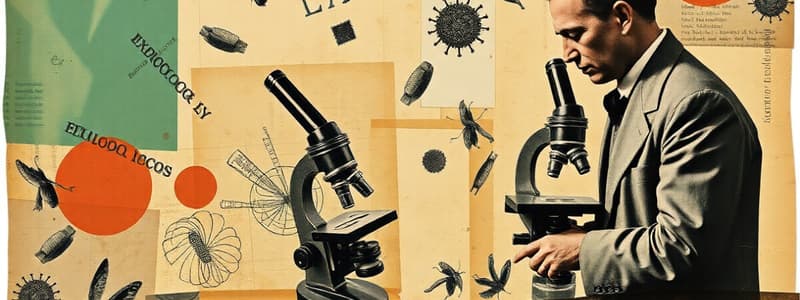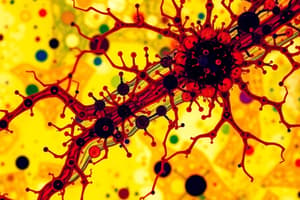Podcast
Questions and Answers
What discipline focuses on the study of fungi?
What discipline focuses on the study of fungi?
- Virology
- Phycology
- Bacteriology
- Mycology (correct)
Who is known as the father of Bacteriology?
Who is known as the father of Bacteriology?
- Galileo Galilei
- Antony Van Leeuwenhoek (correct)
- Robert Hooke
- Roger Bacon
Which percentage of microorganisms are generally considered harmful?
Which percentage of microorganisms are generally considered harmful?
- 1% (correct)
- 50%
- 10%
- 99%
What year did Robert Hooke publish his work, Micrographia?
What year did Robert Hooke publish his work, Micrographia?
Which scientist first developed a lens for microscopes?
Which scientist first developed a lens for microscopes?
What term was first used by Sedillot in 1878 to describe microorganisms?
What term was first used by Sedillot in 1878 to describe microorganisms?
Which theory proposed that life could spontaneously arise from non-living matter?
Which theory proposed that life could spontaneously arise from non-living matter?
Which of the following organisms is studied under Phycology?
Which of the following organisms is studied under Phycology?
What was a significant limitation of gelatin as a medium for culturing bacteria?
What was a significant limitation of gelatin as a medium for culturing bacteria?
Who first proposed the use of agar in culture media?
Who first proposed the use of agar in culture media?
What disease did Edward Jenner first prevent through vaccination?
What disease did Edward Jenner first prevent through vaccination?
What significant discovery did Alexander Fleming make?
What significant discovery did Alexander Fleming make?
Which organism is associated with the syphilis bacteria, as identified by Paul Ehrlich?
Which organism is associated with the syphilis bacteria, as identified by Paul Ehrlich?
Who coined the term 'Virus' for filterable infectious agents?
Who coined the term 'Virus' for filterable infectious agents?
What did Paul Ehrlich study that laid the foundation for biological standardization?
What did Paul Ehrlich study that laid the foundation for biological standardization?
What did Francisco Redi demonstrate through his experiments on decaying meat?
What did Francisco Redi demonstrate through his experiments on decaying meat?
What observation did John Needham make regarding mutton gravy?
What observation did John Needham make regarding mutton gravy?
What invention is Louis Pasteur most noted for?
What invention is Louis Pasteur most noted for?
How did Louis Pasteur prove that microbial growth in swan neck tubes was due to dust and germs?
How did Louis Pasteur prove that microbial growth in swan neck tubes was due to dust and germs?
What significant bacterial structure did John Tyndall discover?
What significant bacterial structure did John Tyndall discover?
What was Lister's conclusion regarding wound infections?
What was Lister's conclusion regarding wound infections?
What process, developed by Tyndall, is used to eliminate bacterial spores?
What process, developed by Tyndall, is used to eliminate bacterial spores?
Which statement best describes the contributions of Louis Pasteur to microbiology?
Which statement best describes the contributions of Louis Pasteur to microbiology?
Flashcards are hidden until you start studying
Study Notes
History of Microbiology
- Microbiology is the study of microscopic organisms like algae, archaea, bacteria, cyanobacteria, fungi, protozoa, and viruses.
- Most microorganisms are harmless and beneficial. Only about 1% are harmful pathogens.
Discovering Microorganisms
- Roger Bacon (1267) developed the first lens.
- Janssen and Janssen (1590) created a crude microscope by combining two lenses.
- Galileo Galilei (1610) improved the microscope with a focusing device called the "occhiale."
- Faber (1625) proposed the microscope.
- Robert Hooke (1665) used a compound microscope to observe microscopic creatures and documented his discoveries in "Micrographia."
Antony van Leeuwenhoek (1632-1723)
- Observed and described protozoa, bacteria, yeasts, and algae using his single lens microscope.
- He observed these microorganisms in water, feces, and teeth scrapings.
- Considered the "Father of Bacteriology and Protozoology."
- He called microorganisms "animalcules" in 1676.
- The term "microbe" was introduced by Sedillot in 1878.
Spontaneous Generation
- The theory that life arises spontaneously from non-living matter.
- Aristotle (384-322 BC) believed in spontaneous generation.
- Roger Bacon (13th century) suggested that diseases were caused by tiny "seeds" or "germs."
Transition Era
- Francesco Redi (1626-1697) disproved spontaneous generation of maggots from decaying meat.
- John Needham (1713-1781) supported spontaneous generation theory. He argued tiny organisms arose spontaneously in mutton gravy.
- Lazzaro Spallanzani (1729-1799) disproved Needham's observations. He showed that boiled broth exposed to air did not produce microbes.
The Golden Era
- Louis Pasteur (1822-1895) is considered the "Father of Medical Microbiology."
- He disproved spontaneous generation with his famous swan-neck flask experiment.
- He developed pasteurization, a process of mild heating to kill harmful microorganisms in liquid.
- Pasteur also studied fermentation and developed vaccines for rabies and anthrax.
- Pasteur coined the terms "aerobic" and "anaerobic."
John Tyndall (1820-1893)
- Discovered highly resistant bacterial structures called endospores.
- Developed the process of tyndallization, repeated heating to kill endospores and sterilize infusions.
Lord Joseph Lister (1827-1912)
- Considered the "Father of Antiseptic Surgery."
- Lister concluded that wound infections were caused by microorganisms.
- He introduced the use of carbolic acid as an antiseptic in surgery.
Robert Koch (1843-1910)
- Demonstrated the role of bacteria in causing disease.
- Perfected the technique of isolating bacteria in pure culture.
- Used gelatin to prepare solid media but it was not ideal because it was digested by many bacteria.
Fanne Eilshemius Hesse (1850-1934)
- One of Koch's assistants proposed the use of agar as a solid culture media.
- Agar is not easily digested by bacteria and has better melting and solidification points than gelatin.
Richard Petri (1887)
- Developed the Petri dish, a container used for growing bacteria on solid media.
Edward Jenner (1749-1823)
- Pioneered the technique of vaccination to prevent smallpox.
Alexander Fleming (1881-1955)
- Discovered penicillin from Penicillium notatum that destroyed several pathogenic bacteria.
Paul Erlich (1854-1915)
- Discovered the treatment of syphilis using arsenic.
- Also made significant contributions to the study of toxins and antitoxins.
Other Significant Discoveries:
- Hansen (1874) discovered the leprosy bacillus.
- Neisser (1879) discovered the gonococcus.
- Ogston (1881) discovered staphylococcus.
- Loeffler (1884) discovered the diphtheria bacillus.
- Roux and Yersin discovered the diphtheria toxin.
Viruses
- Beijerinck (1898) coined the term "virus" for filterable infectious agents.
- Pasteur developed the rabies vaccine.
- Goodpasture pioneered the cultivation of viruses on chick embryos.
- Charles Chamberland developed a porcelain bacterial filter.
- Twort and d'Herelle discovered bacteriophages.
- Edward Jenner developed the smallpox vaccine.
Studying That Suits You
Use AI to generate personalized quizzes and flashcards to suit your learning preferences.



